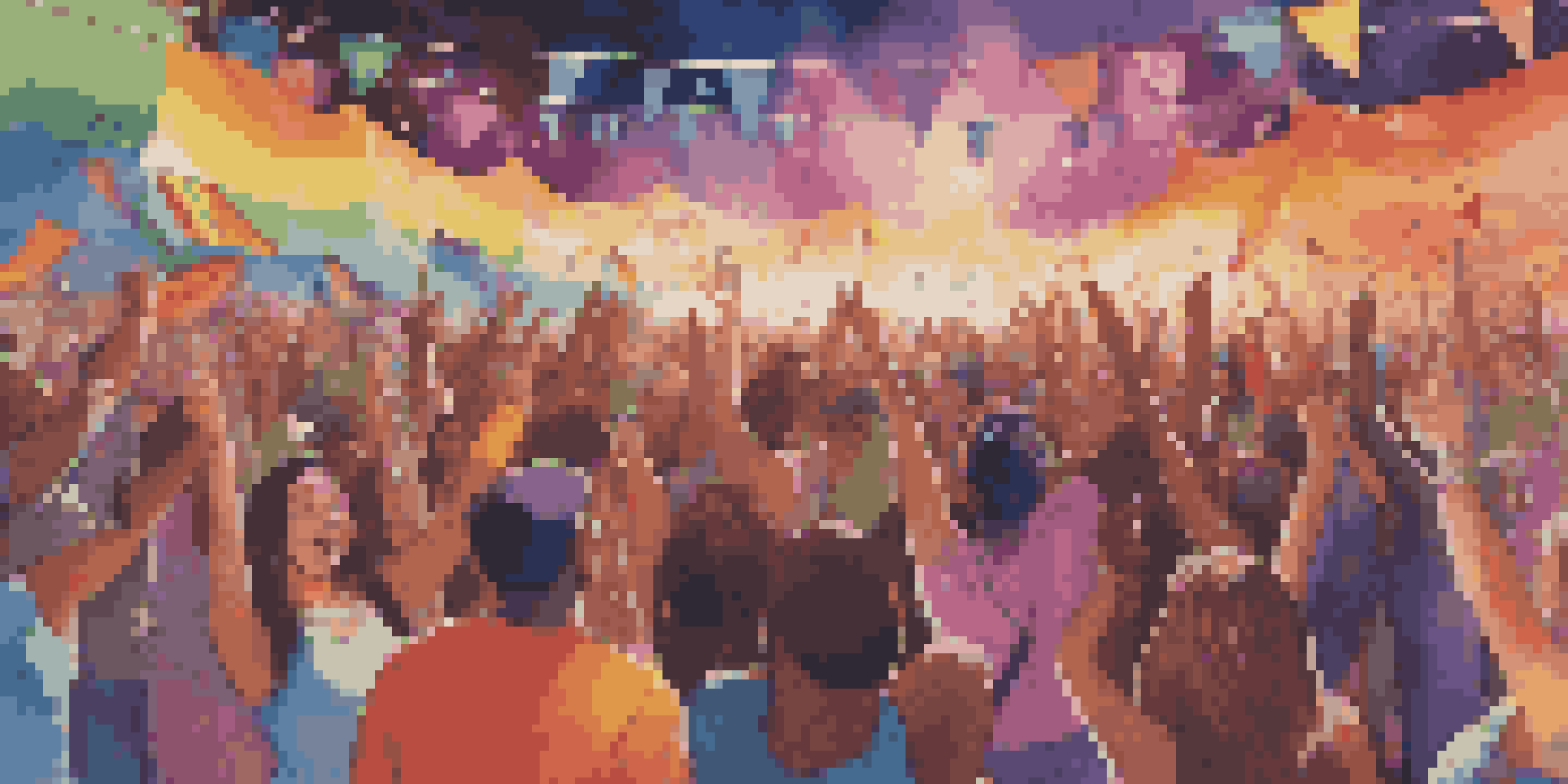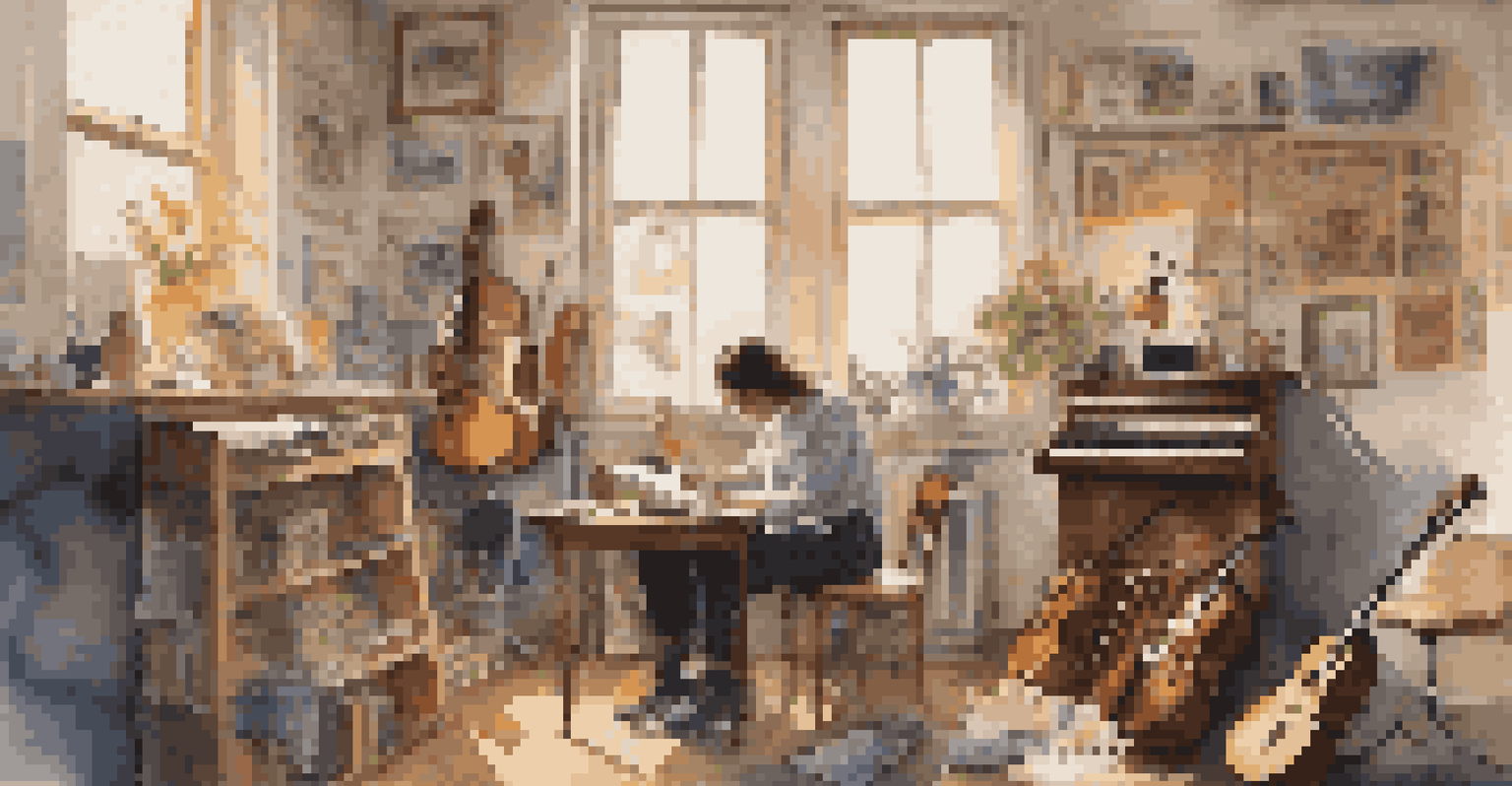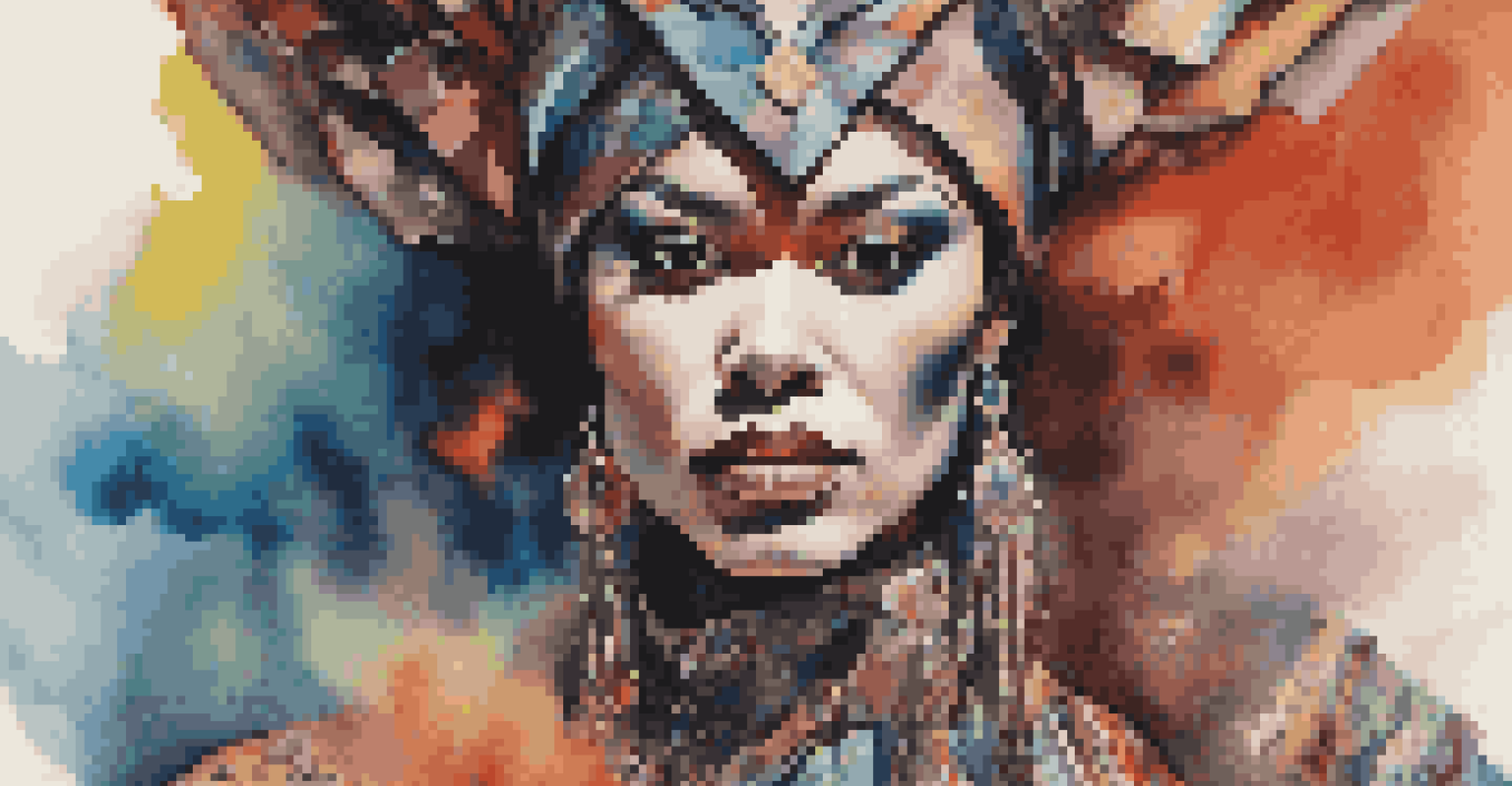The Role of Music in Shaping Gender Identity and Expression

Understanding Gender Identity in a Musical Context
Gender identity refers to how individuals perceive themselves and what they call themselves. In the realm of music, this identity can be expressed in diverse ways, from lyrics to performance styles. Artists often challenge traditional gender norms, using their music as a platform for self-expression and exploration.
Music is a safe place to explore identity and the fluidity of gender.
For instance, artists like David Bowie and Prince have played pivotal roles in blurring gender lines, showcasing that music can be a space for fluidity. Their unique styles and personas encourage listeners to reconsider conventional notions of masculinity and femininity. Thus, music becomes a medium through which gender identity can be celebrated and understood.
Understanding the relationship between music and gender identity can provide insight into broader societal shifts. As artists continue to challenge norms, they inspire listeners to embrace their authentic selves, creating a ripple effect that extends beyond the music world.
The Impact of Lyrics on Gender Expression
Lyrics often serve as a reflection of personal experiences, making them a powerful tool for expressing gender identity. When artists share their journeys through their songs, they can resonate deeply with listeners who may be experiencing similar struggles. This connection fosters a sense of community and understanding among those navigating their own gender expressions.

Take, for example, the poignant lyrics of artists like Sam Smith and Billie Eilish, who openly address themes of love, heartbreak, and self-acceptance. Their vulnerability in sharing such experiences empowers fans to confront their emotions and identities. This authenticity in music allows for a shared exploration of what it means to express gender in today's society.
Music as a Gender Identity Platform
Artists use music to express and explore diverse gender identities, challenging traditional norms and encouraging self-acceptance.
As listeners engage with these lyrics, they may find solace and validation in their experiences. This emotional resonance highlights how music can serve as a powerful catalyst for personal and communal expression, ultimately shaping how individuals view their own identities.
Musical Genres and Gender Norms
Different musical genres often carry distinct associations with gender norms. For instance, rock music has traditionally been viewed as a male-dominated space, while pop music has often embraced more diverse representations. However, as the music landscape evolves, these associations are being challenged and redefined.
The power of music lies in its ability to connect us and help us express who we are.
Artists like Lizzo and Halsey have emerged in the pop genre, boldly challenging stereotypes and celebrating their identities. Their success not only shifts the narrative within pop music but also encourages a broader acceptance of diverse gender expressions. This evolution signifies that music genres can be inclusive and representative of various identities.
As listeners explore these new representations, the perception of gender within musical genres begins to transform. This shift not only impacts artists but also influences fans, prompting them to embrace a wider spectrum of gender identities and expressions within the music they love.
Cultural Influences on Gender and Music
Cultural context plays a significant role in shaping how music intersects with gender identity. Different cultures have distinct norms and expectations regarding gender roles, which can influence the themes artists explore through their music. This diversity enriches the musical landscape and provides various avenues for expressing gender identity.
For example, in many Indigenous cultures, gender is viewed as a spectrum rather than a binary concept. This perspective often finds its way into traditional music and contemporary interpretations, allowing for a deeper exploration of gender beyond Western norms. As a result, listeners from various backgrounds can find representation in music that resonates with their unique experiences.
Lyrics Foster Community and Understanding
Powerful lyrics resonate with listeners, providing validation and a sense of community for those navigating their gender expressions.
By acknowledging these cultural influences, we can appreciate the rich tapestry of gender expression in music. It highlights the importance of understanding how different contexts shape individual experiences, ultimately enhancing our appreciation for the diverse voices within the music world.
The Role of Music Videos in Gender Representation
Music videos have become a vital extension of an artist's expression, often amplifying themes of gender identity and expression visually. Through their imagery, artists can challenge societal norms and present diverse representations of gender. This visual storytelling complements the music, offering a more immersive experience for the audience.
Consider the powerful visuals in videos like 'Formation' by Beyoncé, which celebrates Black femininity and empowerment. Such representations send a strong message about embracing one's identity and challenging the status quo. By showcasing varied expressions, artists can inspire viewers to reflect on their own identities.
As music videos continue to evolve, they play a crucial role in shaping public perceptions of gender. Through innovative visuals and powerful storytelling, they can facilitate discussions around identity and encourage acceptance of diverse gender expressions.
Community and Music: A Safe Space for Gender Expression
Music has the unique ability to bring people together, creating communities where individuals can express their gender identity freely. Concerts, festivals, and local music scenes often serve as safe havens for those exploring their identities. In these spaces, individuals can connect with others who share similar experiences, fostering a sense of belonging.
Consider LGBTQ+ music festivals, which celebrate diverse gender expressions and provide a platform for underrepresented artists. These events not only showcase talent but also create an environment where attendees can celebrate their identities without fear of judgment. This sense of community is vital for personal growth and acceptance.
Cultural Context Shapes Gender in Music
Cultural influences play a crucial role in how gender identity is expressed through music, enriching the diversity of representation.
As music continues to unite people, it reinforces the idea that gender expression is a shared experience. The connections formed within these communities can empower individuals to embrace their identities, further shaping the narrative around gender in music.
Future Trends: The Evolution of Gender in Music
As society progresses, the conversation around gender identity and expression in music is evolving. Emerging artists are breaking barriers, challenging traditional norms, and redefining what it means to express gender through their work. This shift signals an exciting future for music, where inclusivity and representation are at the forefront.
With the rise of platforms like TikTok, new voices are gaining visibility and fostering discussions about gender identity. Artists can share their experiences and connect with audiences in innovative ways, creating a more inclusive music landscape. This democratization of music allows for a broader spectrum of gender expressions to be represented.

As we look ahead, it's clear that the role of music in shaping gender identity will continue to grow. By embracing diversity and pushing boundaries, artists and fans alike can contribute to a more accepting and understanding world, where everyone feels empowered to express their true selves through music.